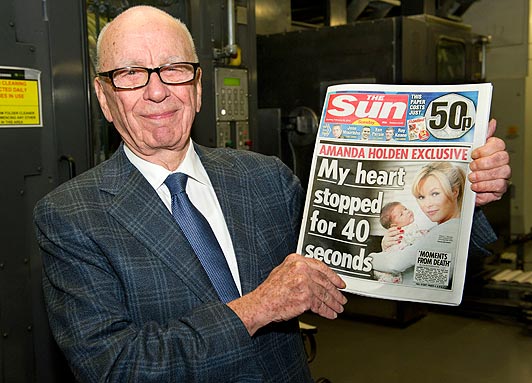
Does James Murdoch’s UK exit bode ill or well for News Corp.’s UK newspapers? That’s the question many are asking.
But, though Murdoch will no longer influence the operation, the issue of personnel may now be a side show to a more pertinent question: is anyone in control of the destinies of The Sun and The Times anyway?
Many will say any move which gives News Corp COO and president Chase Carey more direct auspice over News International suggests a possible winding down of the seeds Rupert sowed. Carey is a TV and movie advocate within the group, and Bloomberg quotes him as saying “there certainly is an awareness” News Corp.’s shares would trade higher without newspapers.
But no-one out there would buy News International assets until its toxic phone hacking and media ethics stink has passed. All that has more time to run and shows every sign of getting worse and worse, now perhaps unstoppably bad.
Rupert Murdoch’s arrival in London to launch Sun On Sunday may have filled the commercial gap left by News Of The World‘s absence, and the launch itself may have proved useful as a position statement on what News Corp says is a reformed News Group Newspapers; a scorched earth tactic.
But, thanks to the Metropolitan Police chief’s revelation last week that The Sun ran a network of corrupt police officers, it is now that very paper which is about to be dragged through the mud backward. Can a Sun which News International says is now clean and new survive prosecutions for practices that are dirty and old? Rupert may yet rue throwing his weight behind the title, one last roll of the dice, ahead of these investigations. This summer, who would bet against The Sun setting like it did on its deceased Sunday stablemate?
After The Sun, what’s left? The Times is a respected newspaper with a strong heritage, but is supported by Sun profits and cannot survive without adjacent supporting revenue or without getting ship-shape toward breakeven by itself. This may have been the logic behind charging for Times digital products. Only the likes of Russian or Middle Eastern oligarchs nowadays snap up loss-making newspapers as trophies.
What is left in consumer news publishing anymore for anyone anyway? That may be Carey’s mindset. With the old print business now fast drying up, it is no longer a great business to be in.
The Times‘ digital strategy, which has been executed well and produced quality products for a small, wealthy audience, appears defensive more than expansive for the wide-open web.
Online, The Sun makes plenty of money from its Sun Bingo gaming site, but, in content, it’s hard to draw a logical line by which its millions of daily print readers migrate to its digital manifestations.
While The Times‘ digital strategy is now mostly supported by iPad, whose owners are still self-selectingly attractive demographic for high-end advertisers, it may be some time before they filter out in to the mass market in a way that can support a Sun migration.
Former Scottish Sun editor Jack Irvine told Sky News: “it seems pretty clear to me that Rupert is now back in charge in Britain. Rupert is still in love with newsprint.”
Another former News Corp footsolder agrees News International is safe. “I’m sure the newspapers will survive,” ex BSkyB (NYSE: BSY) programmes head David Elstein told Sky News on Wednesday, adding that James Murdoch should also leave BSkyB’s board to distance the satcaster from the scandals.
“I’m confident that, at the end of this process, the newspapers will be fine, but there is a long process to be gone through.”